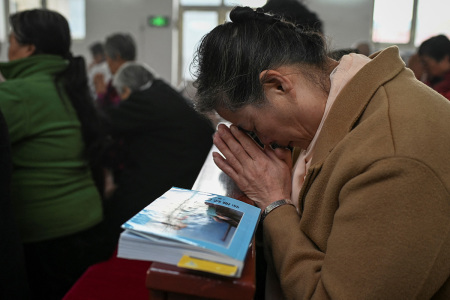Americans visit persecuted ‘Mayflower Church’ in South Korea to thwart repatriation to China

American Christians have regularly visited about 60 Christians from China's "Mayflower Church" who fled to South Korea due to severe persecution in hopes of preventing their repatriation by Seoul, which has refused to grant them asylum, according to a persecution watchdog.
China's Shenzhen Holy Reformed house church came to be known as "Mayflower Church," named after the English ship that carried Pilgrims from England to North America in the early 17th century, after the 60 Chinese Christians, including 30 children, arrived in South Korea's Jeju Island in 2019.
The Christians have been living in a small rented house on the island off the southern tip of South Korea. They have been doing menial jobs to survive, hoping to get asylum in the East Asian country, which has refused to help them due to the Chinese Communist Party's influence, the U.S.-based group ChinaAid reported this month.
The group, which monitors human rights violations inside China, said its American partners have periodically visited the Chinese church in South Korea to prevent them from potential "transnational kidnapping" by the CCP or repatriation by Seoul.
"This is not a farfetched option, as the CCP has kidnapped many in the past who defied them. Gui Minhai, a critic of China's elite, vanished in Thailand seven years ago. More recently, the CCP tried to repatriate Wu Huan and her fiancé because they were political dissidents," the group said.
ChinaAid President and Founder Bob Fu said at the 2022 IRF Summit in late June that the CCP attempted to use technology to locate the church's pastor, Pan Yongguang, and the others. The Chinese Embassy in South Korea has also called some of the church members on the island, telling them they betrayed their country and must return home.
Due to these fears, Deana Brown, president and founder of Freedom Seekers International, visited the Mayflower Church in June.
"She contracted COVID-19 on her way to Jeju Island, but Pastor Pan and his congregants cared for her until she recovered. Another set of church partners witnessed the birth of the 61st member of the Mayflower congregation. Two other women expect their babies later this year."
In a July 29 update, Brown stated that when Americans, Japanese and Taiwanese Christians heard of the congregation's situation, they "committed to traveling to Jeju Island to provide a protection to The Mayflower knowing their presence would deter any attempt by China to harm the tiny congregation."
The first diplomatic protection trip embarked on June 13. Since then, four other Americans have traveled to the island. According to Brown, "many more are expected to visit them over the summer and fall."
"The Mayflower rejoices that they feel safer and have more freedom to move about," Brown wrote. "We are thankful for the privilege to provide such a measure of freedom for those who long for it."
Other partners of ChinaAid and FSI have also visited the Christians consistently, "leaving a lasting American presence on the island."
South Korea's Gwangju High Court rejected the Chinese Christians' final asylum appeal. They now face "imminent deportation," according to Doug Bandow, a senior fellow at the Washington, D.C.-based think tank the Cato Institute.
"It was a particularly bizarre stance for outgoing President Moon Jae-in's government to take, given the significant number of Christians in South Korea," wrote Bandow in an op-ed published by Foreign Policy in March. "It is not hard to envision the reception Mayflower refugees will face if forcibly repatriated to China."
"In 2018, Pan joined his friend Wang Yi, who pastored an unregistered 500-member home church, and 456 other house church pastors in signing a statement protesting rising persecution," Bandow added. "Later that year, the authorities detained Wang and some 100 members after raiding a Sunday evening service. In 2019, he was tried and sentenced to nine years in prison for 'subversion of state power.'"
The Wall Street Journal reported in June 2021 that the Chinese Christian families wanted to resettle in the U.S.
Pan, trained by pastors from a U.S.-based Reformed Presbyterian Church, had been detained and questioned by authorities in China. The Wall Street Journal added that a couple of church members who returned to China also faced retribution. Their homes were raided, and their movements restricted.
Open Doors USA, which monitors the persecution of Christians in over 60 countries, estimates that China has more than 97 million Christians, many of whom worship in unregistered or "illegal" underground churches.
The five state-sanctioned religious groups in China are the Buddhist Association of China, the Chinese Taoist Association, the Islamic Association of China, the Protestant Three-Self Patriotic Movement and the Chinese Patriotic Catholic Association.
Even the organizations affiliated with the five authorized religions can be subject to surveillance and monitoring.
In 2018, the Chinese government banned the sale of Bibles at online bookstores across the country to comply with a "white paper" that dictated compliance with the "core values of socialism."
At the time, copies of Bibles were removed from online retailers following the release of a regime document titled "China's Policies and Practices on Protecting Freedom of Religious Belief."
The white paper declared that Chinese faith communities "should adhere to the direction of localizing the religion, practice the core values of socialism, develop and expand the fine Chinese tradition and actively explore the religious thought which accords with China's national circumstances."





















